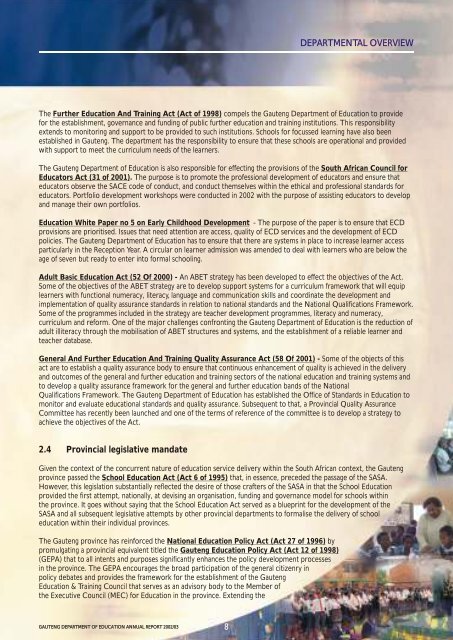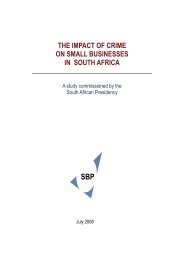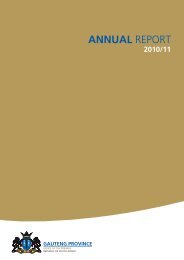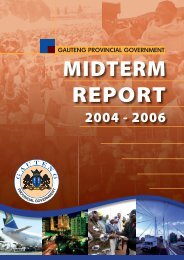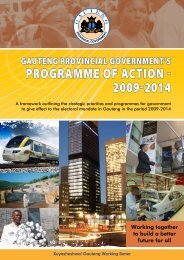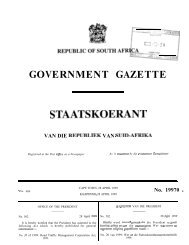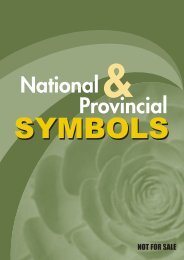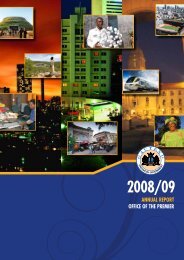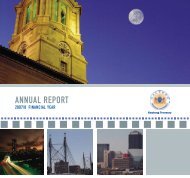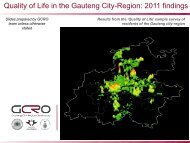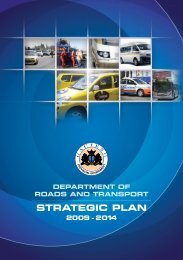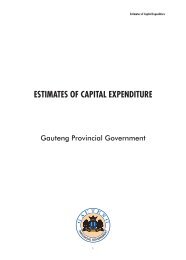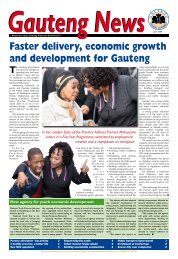Education Annual Report 2002-2003 - Gauteng Online
Education Annual Report 2002-2003 - Gauteng Online
Education Annual Report 2002-2003 - Gauteng Online
You also want an ePaper? Increase the reach of your titles
YUMPU automatically turns print PDFs into web optimized ePapers that Google loves.
DEPARTMENTAL OVERVIEWThe Further <strong>Education</strong> And Training Act (Act of 1998) compels the <strong>Gauteng</strong> Department of <strong>Education</strong> to providefor the establishment, governance and funding of public further education and training institutions. This responsibilityextends to monitoring and support to be provided to such institutions. Schools for focussed learning have also beenestablished in <strong>Gauteng</strong>. The department has the responsibility to ensure that these schools are operational and providedwith support to meet the curriculum needs of the learners.The <strong>Gauteng</strong> Department of <strong>Education</strong> is also responsible for effecting the provisions of the South African Council forEducators Act (31 of 2001). The purpose is to promote the professional development of educators and ensure thateducators observe the SACE code of conduct, and conduct themselves within the ethical and professional standards foreducators. Portfolio development workshops were conducted in <strong>2002</strong> with the purpose of assisting educators to developand manage their own portfolios.<strong>Education</strong> White Paper no 5 on Early Childhood Development - The purpose of the paper is to ensure that ECDprovisions are prioritised. Issues that need attention are access, quality of ECD services and the development of ECDpolicies. The <strong>Gauteng</strong> Department of <strong>Education</strong> has to ensure that there are systems in place to increase learner accessparticularly in the Reception Year. A circular on learner admission was amended to deal with learners who are below theage of seven but ready to enter into formal schooling.Adult Basic <strong>Education</strong> Act (52 Of 2000) - An ABET strategy has been developed to effect the objectives of the Act.Some of the objectives of the ABET strategy are to develop support systems for a curriculum framework that will equiplearners with functional numeracy, literacy, language and communication skills and coordinate the development andimplementation of quality assurance standards in relation to national standards and the National Qualifications Framework.Some of the programmes included in the strategy are teacher development programmes, literacy and numeracy,curriculum and reform. One of the major challenges confronting the <strong>Gauteng</strong> Department of <strong>Education</strong> is the reduction ofadult illiteracy through the mobilisation of ABET structures and systems, and the establishment of a reliable learner andteacher database.General And Further <strong>Education</strong> And Training Quality Assurance Act (58 Of 2001) - Some of the objects of thisact are to establish a quality assurance body to ensure that continuous enhancement of quality is achieved in the deliveryand outcomes of the general and further education and training sectors of the national education and training systems andto develop a quality assurance framework for the general and further education bands of the NationalQualifications Framework. The <strong>Gauteng</strong> Department of <strong>Education</strong> has established the Office of Standards in <strong>Education</strong> tomonitor and evaluate educational standards and quality assurance. Subsequent to that, a Provincial Quality AssuranceCommittee has recently been launched and one of the terms of reference of the committee is to develop a strategy toachieve the objectives of the Act.2.4 Provincial legislative mandateGiven the context of the concurrent nature of education service delivery within the South African context, the <strong>Gauteng</strong>province passed the School <strong>Education</strong> Act (Act 6 of 1995) that, in essence, preceded the passage of the SASA.However, this legislation substantially reflected the desire of those crafters of the SASA in that the School <strong>Education</strong>provided the first attempt, nationally, at devising an organisation, funding and governance model for schools withinthe province. It goes without saying that the School <strong>Education</strong> Act served as a blueprint for the development of theSASA and all subsequent legislative attempts by other provincial departments to formalise the delivery of schooleducation within their individual provinces.The <strong>Gauteng</strong> province has reinforced the National <strong>Education</strong> Policy Act (Act 27 of 1996) bypromulgating a provincial equivalent titled the <strong>Gauteng</strong> <strong>Education</strong> Policy Act (Act 12 of 1998)(GEPA) that to all intents and purposes significantly enhances the policy development processesin the province. The GEPA encourages the broad participation of the general citizenry inpolicy debates and provides the framework for the establishment of the <strong>Gauteng</strong><strong>Education</strong> & Training Council that serves as an advisory body to the Member ofthe Executive Council (MEC) for <strong>Education</strong> in the province. Extending theGAUTENG DEPARTMENT OF EDUCATION ANNUAL REPORT <strong>2002</strong>/038


